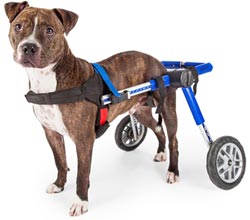 It’s hard not to fall for the underdog, and pets with special needs tend to tug on our heartstrings the hardest, of course. Although it can be rewarding to give that special creature a loving forever home, caring for a pet with unique needs isn’t for the fainthearted; in fact, it usually means that these pets require a lot of extra time, patience, and often a change in your normal routine to accommodate their needs. For those animal lovers who are determined to open their hearts and arms, here’s what you should be prepared to do when you’re adopting that special cat or dog.
It’s hard not to fall for the underdog, and pets with special needs tend to tug on our heartstrings the hardest, of course. Although it can be rewarding to give that special creature a loving forever home, caring for a pet with unique needs isn’t for the fainthearted; in fact, it usually means that these pets require a lot of extra time, patience, and often a change in your normal routine to accommodate their needs. For those animal lovers who are determined to open their hearts and arms, here’s what you should be prepared to do when you’re adopting that special cat or dog.
Do Your Research
What specific problems or needs does your new pet have? Do they need medication, prescription food, special training, or a particular home care routine? Although Dr. Google is where many people turn to for advice, it’s better to talk with professionals like your veterinarian, behaviorist, and staff at the rescue or shelter that you’re adopting from. Ask about what the future may hold for your pet, especially if they have a chronic disease that affects their long term health.
Continue Reading→
 It seems that
It seems that 
